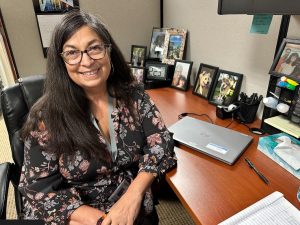Inside Athena: Athena Home Health & Hospice’s End-of-Life Doula
FARMINGTON, C.T. — Experiencing the loss of a loved one is never easy. Many emotions may occur, and Laurie Wilcox wants to support people in that process.
She has been Athena Home Health & Hospice‘s Bereavement Coordinator since September, but has been a volunteer with the agency since March.

Wilcox is currently training to be an End-of-Life, or death, Doula. She said it’s like the “cousin” to a birth doula. It is rare to find someone with the certification, which takes 40 hours of training and recertification every three years. Reports show there are about 2,000 doulas worldwide. Wilcox hopes to get her certification after she completes the year-long training program; however, she is already making an impact.
“I’m trying to meet with families within the first week or two when they’re actually coming on board with us. That way, when it gets down to things being more complicated at the end of life, they’re already more familiar with who I am,” she said. “They do know me at that time.”
She provides support to the patient and their loved one through non-medical means. Wilcox said they are trained in active listening to be there for the person. She works with the patient and loved ones to make them comfortable with hospice services and understand what is going on in their life.
“More often than not, it’s about asking them questions open-endedly so they can discuss more,” she said. “They begin to ask questions and when the questions come, oftentimes it’s just a matter of listening, taking a pause, handing the question back to them in a really caring and comfortable way like, ‘It sounds like…’, ‘What I hear you saying…'”
She often leaves herself out of the conversation although death has been a part of her life. Both her parents and husband died on hospice. She also lost her son, sister, and brother. In fact, her passion for hospice began while her dad was receiving care. The hospice team couldn’t get to him because of winter weather, so Wilcox took charge. It motivated her to become a hospice nurse aide, which she did for nine years before becoming a hospice nurse for three more years. She then left and became a mortician, eventually moving to Connecticut and pursuing the doula certificate.
“It’s very rewarding work to help people that seem to have no way out of their predicament or who have that sense of ‘when is this going to happen?’ or ‘why is this happening?’ and to give them a safe space to talk,” she said.
Creating a safe space is very important to her. She often finds that patients will share information with her they are not comfortable sharing with family such as guilt or concerns.
Many times, when a person goes on hospice, they have been battling a life-limiting illness for a while. In turn, families have been carrying the thought of loss for just as long. Wilcox said it can be “very weighty and can be filled with a lot of questions and a lot of frustration.”
“Oftentimes, people don’t know what to say to somebody whose been going through the wringer for such an extended period of time,” she said. “Everybody wants to try and fix it or make it better for them. Very few people take the time to put away the phone, to sit down, have a direct conversation about the hard things and that’s what death doulas do best.”
After a person passes, there are 13 months of follow-up from the hospice team. Within the first week, Wilcox will reach out to see how the family is coping. The hospice team will then send out signed letters and resources to help the family grieve.
“Every situation is unique,” she said. “As long as we look at each family and each situation as unique onto itself, we’ll always gain something.”
Follow Athena Health Care Systems on X and Facebook & Athena Home Health & Hospice on Facebook. Interested in a career with Athena? Click here!

